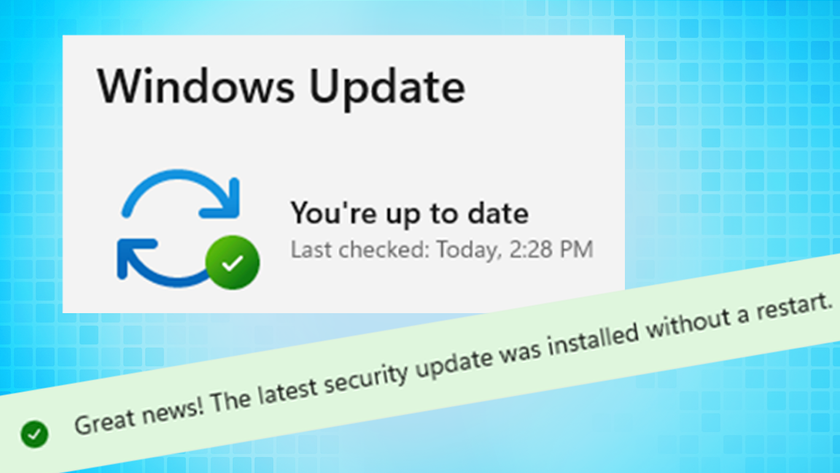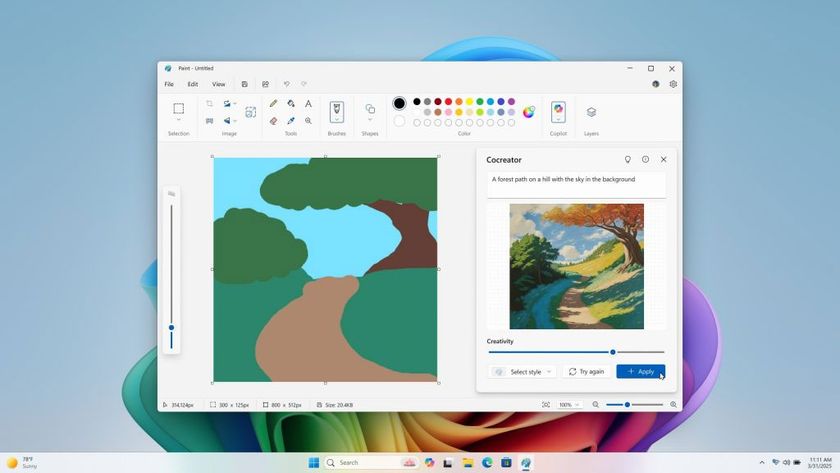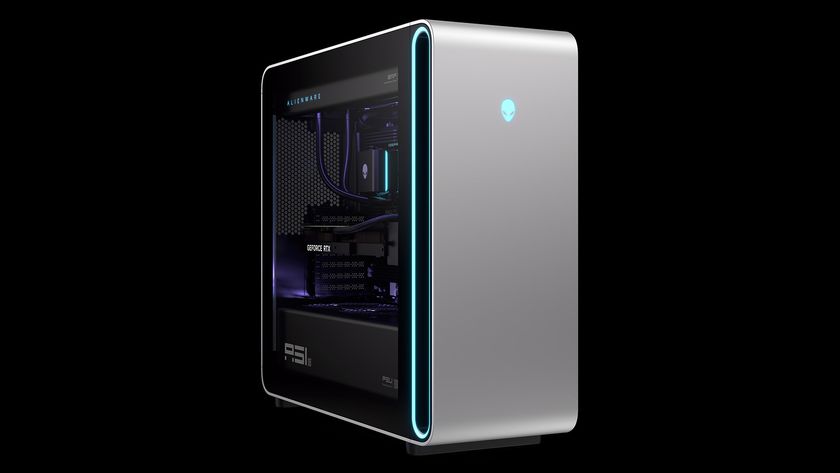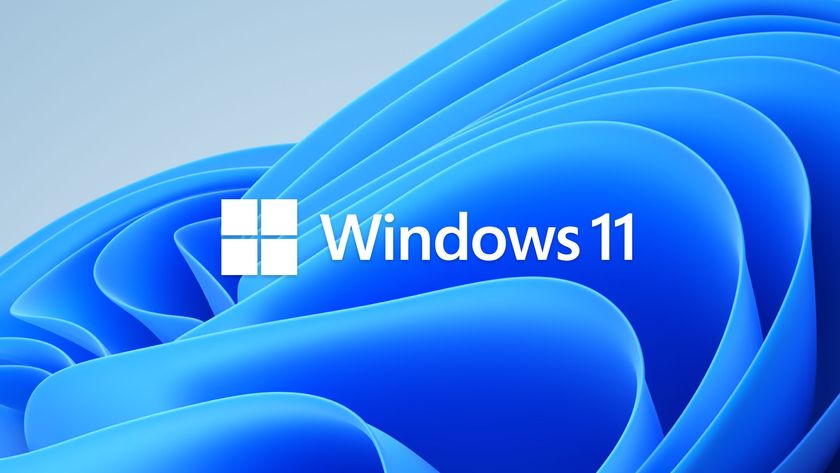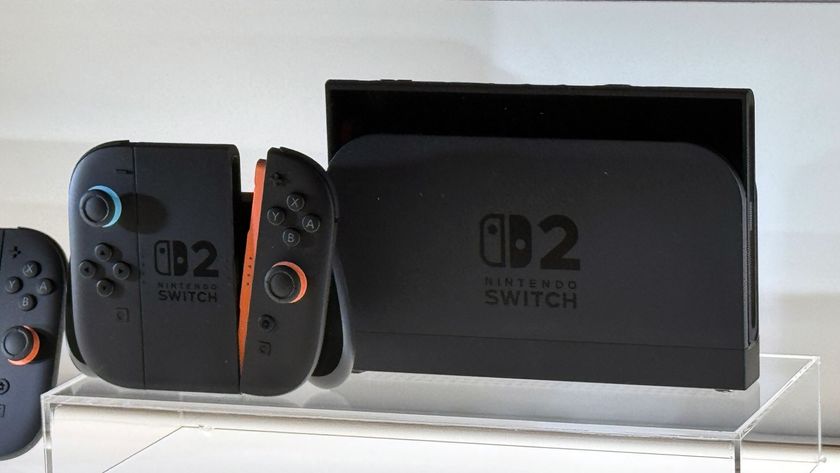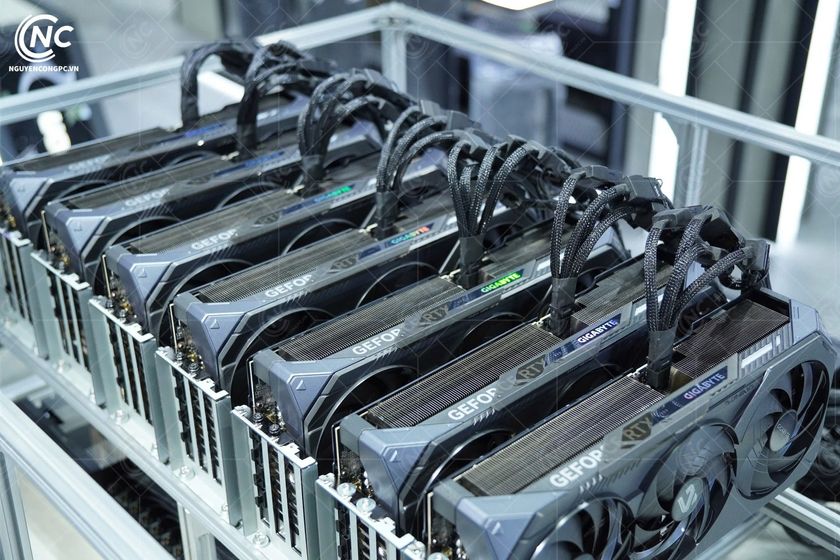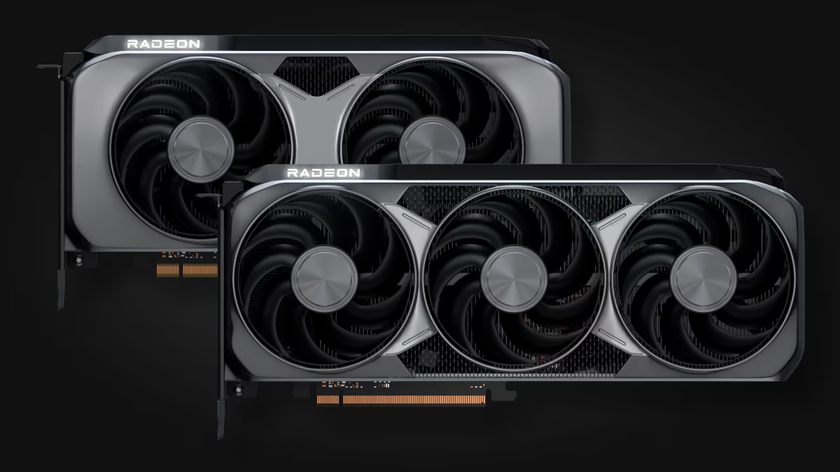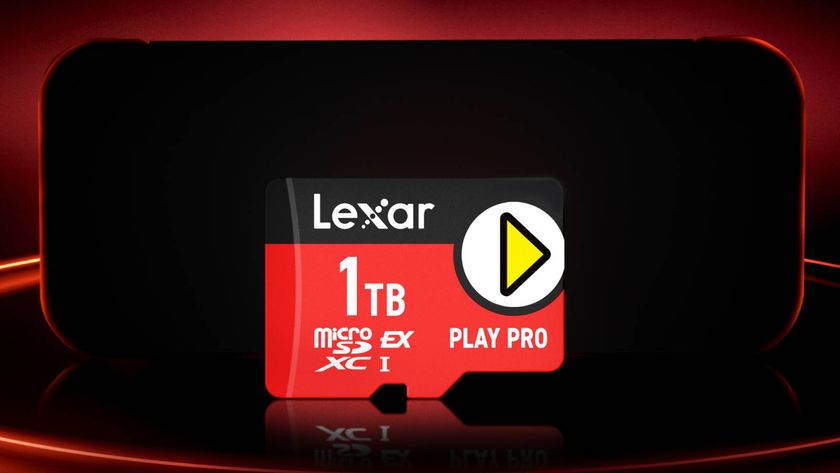Windows 11 skips past 50% market share milestone in latest Steam survey
It gained an impressive 3.36% of users in August to end up with 50.81% share.

Microsoft’s Windows 11 operating system strode past a major market share milestone in August. The newest version of Windows gained an impressive 3.36% market share, according to the newest Steam Hardware Survey data. Thanks to this significant rise, Windows 11 was the OS of choice of over 50% of Steam users in August 2024, or 50.81% of users - to be precise.
Looking closer at the OS popularity data, the growth of Windows 11 in August seems to be entirely from people moving up from Windows 10. As Windows 11 gained 3.36%, Windows 10 lost 3.29% of its Steam user base. Tiny numbers of the remaining Windows 8.1, Windows 7, and ‘other’ devotees also appear to have migrated.
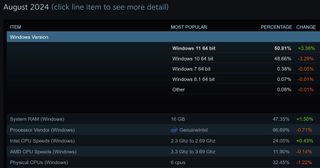
It is pretty big news that Windows 11 has at last gone over 50% in this gamer-centric survey, after nearly three years of availability and heavy promotion. However, Windows 10 isn’t giving up without a fight. In May, we noticed that Statcounter figures were actually showing a small Windows 10 resurgence. This goes against the grain of factors like the difficulty in finding PCs for sale with the older OS installed, being able to buy copies of the older OS, and Microsoft’s pushy sales and upgrade techniques nagging folk to make the switch.
For those still using Windows 10, other than being irked by the constant reminders to upgrade, the end of support for their preferred Windows OS looms troublingly close on the horizon. Microsoft indicates that after October 14, 2025, it “will no longer provide security updates or technical support for Windows 10.” That’s just a little over a year from now. With 48.6% of Windows users still preferring this OS, according to the latest Steam data, there are a lot of people who will have to migrate over a short period.
Considering the wider OS picture, Steam’s latest data shows MacOS share down very slightly to 1.30% in August. Meanwhile, we are a little surprised to see Linux down a smidgen (-0.16%) to 1.92% in August. The open-source OS seems to have enjoyed a notable growth spurt in recent months according to other stats sources like Statcounter. According to that web-based OS tallying source’s trend lines, we might even see 5% of users on Linux by the end of this year, or early next.
There are plenty more interesting nuggets in the latest SHS if you care to take a visit. Other highlights we noted were the uptrend in octa-core and dodeca-core CPUs, while hexa-core systems dipped. Looking at GPUs, Nvidia’s RTX 4060 Laptop GPU was the biggest winner, moving up 1.36% to claim second place in the charts behind the long-time champ we all know as the RTX 3060.
Stay On the Cutting Edge: Get the Tom's Hardware Newsletter
Get Tom's Hardware's best news and in-depth reviews, straight to your inbox.

Mark Tyson is a news editor at Tom's Hardware. He enjoys covering the full breadth of PC tech; from business and semiconductor design to products approaching the edge of reason.
-
atmapuri Its not yet clear how this transition is suppose to happen considering that the primary reason for not upgrading is perhaps unsupported hardware? And maybe the world PC industry cant produce so many new PCs in next 10 years, that would be compatible with Windows 11? Or Microsoft will just shut down half of all computers running worldwide?Reply -
USAFRet Reply
Pretty much every mainstream PC sold since 2018 is "Win 11 compatible".atmapuri said:And maybe the world PC industry cant produce so many new PCs in next 10 years, that would be compatible with Windows 11? -
kyzarvs I do think I may well finally join the penguins for my home machine. Gaming seems to have come along enough that it's not a massive ballache. It's very rare that I buy a game in the first year of release, I've run Redhat / Debian servers for over 20 years and I'm getting sick to death of Windows built-in bloat and tracking. I'll run whatever work gives me on their laptops, but for home... maybe just maybe it will be time when 10 dies.Reply -
Alvar "Miles" Udell It's not that much of a surprise. In this "gamer" segment the number of machines which cannot be upgraded to Windows 11 by hardware restriction are few, pretty much limited to Intel 6700/7700 and Zen 1, and the reasons for that segment to not use Windows 11 are also pretty much limited to choice, possibly influenced by mis-information.Reply
When it comes to office computers and other non-gaming systems is when you run into the real problem of upgrading because they're fast enough for their intended task and upgrading isn't really justifiable, might like higher end smart phones which are still perfectly fine yet out of support, like the Galaxy S10. -
Newb888 Reply
It's not just that. Having downgraded from W11 to W10 there are noticeable performance issues with W11 such as when you right click on the context menu and applications even W11 default application such as Control Panel and other system components are slow and the snappiness of W10 is gone.Alvar Miles Udell said:When it comes to office computers and other non-gaming systems is when you run into the real problem of upgrading because they're fast enough for their intended task and upgrading isn't really justifiable, might like higher end smart phones which are still perfectly fine yet out of support, like the Galaxy S10.
I'll hold out for, maybe W12 or until "free" software vendors like Google for (Chrome) and others won't allow me to upgrade their applications. -
ReplyAlvar Miles Udell said:the reasons for that segment to not use Windows 11 are also pretty much limited to choice, possibly influenced by mis-information.
Hahah... yeah. I'd wager that most that complain about how bad W11 is have never actually installed it. I personally think it's the best Windows ever... and I started with W95.
A thread yesterday had a W7 user saying that both W10 and W11 were horrible. :ROFLMAO: -
Alvar "Miles" Udell ReplyTeamRed2024 said:Hahah... yeah. I'd wager that most that complain about how bad W11 is have never actually installed it. I personally think it's the best Windows ever... and I started with W95.
A thread yesterday had a W7 user saying that both W10 and W11 were horrible. :ROFLMAO:
Most of the rest probably come from people who use it and complain just to complain, usually about nonissues. -
cyrusfox Reply
I can see how some might find Windows 11 to be an improvement, and it's great to hear that you're enjoying it. However, my experience has been different, particularly when it comes to the search functionality. Since Windows 8, and continuing with through to Windows 11, I've felt that the integration of online search results when using the Windows key is a step back from the local search efficiency we had in Windows 7. This change compelled me to use a third-party app like Everything.exe to quickly find local files.TeamRed2024 said:Hahah... yeah. I'd wager that most that complain about how bad W11 is have never actually installed it. I personally think it's the best Windows ever... and I started with W95.
A thread yesterday had a W7 user saying that both W10 and W11 were horrible. :ROFLMAO:
And same with microsoft office😡, push towards cloud integration in Office has introduced extra steps for saving a file locally. I prefer the traditional file explorer interface for saving documents, and the new default cloud-saving option adds unnecessary clicks to my workflow. Microsoft has shifted its focus towards creating an ecosystem of services, which do not align with user preferences for simplicity and direct control. While I understand the benefits of cloud integration and a connected experience, I miss the straightforward usability that Windows 7 offered. -
KyaraM Reply
No idea what you are talking about, honestly... feels the exact same to me. Actually, when right-clicking on a program on my Win 10 work laptop (12th gen Intel, so not old by any means), I get the doughnut and have to wait over a second forthe menu to open. Don't have that with my Win 11 machines.Newb888 said:It's not just that. Having downgraded from W11 to W10 there are noticeable performance issues with W11 such as when you right click on the context menu and applications even W11 default application such as Control Panel and other system components are slow and the snappiness of W10 is gone.
I'll hold out for, maybe W12 or until "free" software vendors like Google for (Chrome) and others won't allow me to upgrade their applications.
That's my experience, too...TeamRed2024 said:Hahah... yeah. I'd wager that most that complain about how bad W11 is have never actually installed it. I personally think it's the best Windows ever... and I started with W95.
A thread yesterday had a W7 user saying that both W10 and W11 were horrible. :ROFLMAO:
And all the peoblems people here complain about with Win 11 are issues I have either exclusively, or also, on my Win 10 machines... very often it sounds like rose-colored glasses to me.Alvar Miles Udell said:Most of the rest probably come from people who use it and complain just to complain, usually about nonissues.
You know you can turn off online search?cyrusfox said:I can see how some might find Windows 11 to be an improvement, and it's great to hear that you're enjoying it. However, my experience has been different, particularly when it comes to the search functionality. Since Windows 8, and continuing with through to Windows 11, I've felt that the integration of online search results when using the Windows key is a step back from the local search efficiency we had in Windows 7. This change compelled me to use a third-party app like Everything.exe to quickly find local files.
And same with microsoft office😡, push towards cloud integration in Office has introduced extra steps for saving a file locally. I prefer the traditional file explorer interface for saving documents, and the new default cloud-saving option adds unnecessary clicks to my workflow. Microsoft has shifted its focus towards creating an ecosystem of services, which do not align with user preferences for simplicity and direct control. While I understand the benefits of cloud integration and a connected experience, I miss the straightforward usability that Windows 7 offered.
https://www.ghacks.net/2021/11/26/how-to-turn-off-search-the-web-results-in-windows-11/I agree that the saving interface in 365 and other, newer bought options of Office aren't great, though. Sasly, it doesn't matter what Windows version you use for that. -
kyzarvs Reply
As a busy Office user, I completely agree with that.cyrusfox said:I can see how some might find Windows 11 to be an improvement, and it's great to hear that you're enjoying it. However, my experience has been different, particularly when it comes to the search functionality. Since Windows 8, and continuing with through to Windows 11, I've felt that the integration of online search results when using the Windows key is a step back from the local search efficiency we had in Windows 7. This change compelled me to use a third-party app like Everything.exe to quickly find local files.
And same with microsoft office😡, push towards cloud integration in Office has introduced extra steps for saving a file locally. I prefer the traditional file explorer interface for saving documents, and the new default cloud-saving option adds unnecessary clicks to my workflow. Microsoft has shifted its focus towards creating an ecosystem of services, which do not align with user preferences for simplicity and direct control. While I understand the benefits of cloud integration and a connected experience, I miss the straightforward usability that Windows 7 offered.
I use Outlook 2019 on one machine and the O365 apps on another. I have an (I guess you'd call it still) Exchange account + 4 other IMAP accounts and receive roughly 250-300 mails a day. 2019 is pretty good, but the 365 app is barely useable - frequent display glitches where part of the screen either doesn't display or is displayed multiple times, frequent crashes and lot's of issues with settings randomly appearing / disappearing. The pure web-based version is fine for single accounts, or mailboxes that aren't that busy, but if you depend on getting through a lot of emails every day so you can finish your day on time, it's a grim picture at the moment. I also agree on online - if you work the MS way, then it's not bad, but woe betide you if you want to do things in your own way, or have another service you want to save to.
I also use W11 on multiple machines and that's my rub with the "just do x / y / z to change things" crowd, which used to be a big problem with the Linux desktop advice - I have a day job, I want to spend minimal time faffing with the O/S and as much time as possible making money so I can finish work on time each day. Not having quicklaunch for example is just dumb - it takes up much less space and doesn't move around like adding things to the taskbar does. It was great in XP-10, why remove it? Why have the taskbar un-scaleable? Performance is OK - I tend to find it adapts to low-spec machines well, but actually is slower on bigger kit than 10. I find the increasing obtuseness of being able to get to detailed settings very tedious and I have less than zero interest in AI on my desktop. I don't like the increasing reliance on web access and the relentless push to only work the MS way, I would prefer an O/S to help me, not force me.
